|
|
|
Sort Order |
|
|
|
Items / Page
|
|
|
|
|
|
|
| Srl | Item |
| 1 |
ID:
158092
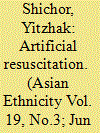

|
|
|
|
|
| Summary/Abstract |
Pan-Turkism emerged in the middle of the 19th century as an attempt to uniting all Turkic people along the Silk Road from the Mediterranean to China. After the ascent of modern Turkey under Mustafa Kemal as well as the Soviet incorporation of Central Asia, pan-Turkism had practically withered – although apparently not as an ideology. Indeed, the collapse of the Soviet Union and the subsequent independence of the Central Asia republics have provided for the revival of the pan-Turkism vision, perceived by Beijing as a threat not only to its interests in Central Asia but, moreover, to Xinjiang’s internal stability and China’s sovereignty. While this vision could hardly be accomplished, China’s intensive preoccupation with pan-Turkism has facilitated its artificial resuscitation, though it appears already deceased. Xi Jinping’s One Belt One Road initiative aims, among other things, at blocking pan-Turkism.
|
|
|
|
|
|
|
|
|
|
|
|
|
|
|
|
| 2 |
ID:
168970
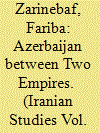

|
|
|
|
|
| Summary/Abstract |
The first part of the paper examines the evolution and transformation of Safavid ideology in the context of confessional changes and the role of Turkoman tribes in the Safavid social movement in the Ottoman‒Iranian borderland. The second part examines the impact of Ottoman‒Safavid wars and religious rivalry on the society and economy of Azerbaijan from the sixteenth to the eighteenth centuries.
|
|
|
|
|
|
|
|
|
|
|
|
|
|
|
|
| 3 |
ID:
163252
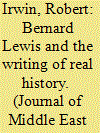

|
|
|
|
|
| Summary/Abstract |
Recent appraisals of Bernard Lewis’s career and scholarship have tended to neglect somewhat the research he carried out at London University’s School of Oriental African Studies (SOAS) before his move to Princeton in 1974. This early work resulted in important publications on Isma‘ilism, the Ottoman archives and modern Turkish history, but he also published highly influential books dealing with pre-modern Islamic history and culture. A survey of his early publications reveals certain recurring topics and preoccupations, including Isma‘ilism considered as a political and cultural revolution manqué, the potential dangers of a clash of civilizations, and Muslim responses to the challenges of modernization and Westernization. Lewis’s style and lucidity have contributed greatly to his influence as a historian.
|
|
|
|
|
|
|
|
|
|
|
|
|
|
|
|
| 4 |
ID:
168982


|
|
|
|
|
| Summary/Abstract |
This article presents two hitherto unstudied compilations of verses from the Bustān of Saʿdī. Both circulated in the Persianate world in the fifteenth and sixteenth centuries. The article provides an analysis of the compilations’ content as well as their relation to the complete Bustān. By highlighting certain stories and themes at the expense of others, and by ordering these passages in a way that differs from the complete Bustān, each compilation transforms Saʿdī’s text into a shorter, more homogenous composition, with distinct formal, thematic, and generic qualities. The shorter compilation presents a series of aphorisms, forming a mirror for princes. The longer one offers a selection of stories and lessons and emphasizes mystical themes, including aspects of Sufi erotic theology. This article also investigates the manuscript copies of these compilations, revealing their use and transmission in Iran, Turkey, and Central Asia between 1470 and 1550.
|
|
|
|
|
|
|
|
|
|
|
|
|
|
|
|
| 5 |
ID:
179889
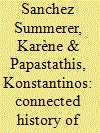

|
|
|
|
|
| Summary/Abstract |
The special issue critically explores, at a micro and macro level, the structural role and religious, cultural and political interactions of the Greek-Orthodox, Melkite and Syriac communities in late Ottoman and Mandate Syria and Palestine. It seeks to identify archival gaps, and to link the study of the micro-scale level of everyday cultural and religious life to the macro-narratives of global change affecting Christian communities, in a connected perspective, via dynamics of cultural and religious personal and institutional interactions. The Christian communities, both as institutions and lay bodies, are of special interest for the field of Levantine studies, since they were placed at the heart of the local power game, expressing the quest for social emancipation, while also keeping close links with diplomatic actors, colonial institutions, and foreign religious agents. The research presented lies on the idea that the communities in focus were inextricably linked, being actors operating within the same multi-ethnic periphery, having the same legal status, and being in contact to foreign agents, while at the same time politically dependent to the centralized ottoman and mandatory authorities.
|
|
|
|
|
|
|
|
|
|
|
|
|
|
|
|
| 6 |
ID:
163833
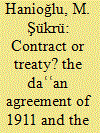

|
|
|
|
|
| Summary/Abstract |
A seminal flashpoint in the scholarly discussion of the post-1872 relationship between the Ottoman empire and its province of Yemen is the Daʿʿan Agreement of 1911. Previous scholarship studying this agreement and its historical context insists that the Ottoman government conceded administrative authority to Imām Yaḥyā Ḥamīd al-Dīn bordering on independence across a vast portion of the Province of Yemen. This study asserts otherwise. The devolution bestowed upon him was far more limited, and the Ottoman authorities never treated him as a leader on equal footing with them. They granted autonomy solely on a contractual basis which could be annulled by the authorizing party, not by a treaty to be adhered to by all contracting parties. The article examines the relations between Imām Yaḥyā and the Ottoman Government beginning with the Zaydī leader’s de facto control over the Jibāl, or the highlands within Upper Yemen. It focuses on the preparations and implementation for the contract of Daʿʿan and discusses Imām Yaḥyā’s status following the contract and the nature of his authority over the region delimited by this agreement.
|
|
|
|
|
|
|
|
|
|
|
|
|
|
|
|
| 7 |
ID:
120070
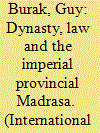

|
|
|
|
|
| Publication |
2013.
|
| Summary/Abstract |
This study looks at the history of two madrasas in Jerusalem, al-Madrasa al-?Uthmaniyya and al-Madrasa al-Fanariyya from the 15th to the 18th centuries, in order to examine an understudied Ottoman institution: the imperial provincial madrasa. The imperial madrasas were assigned to the state-appointed Hanafi muftis of different localities across the empire. This essay argues that these learning institutions helped to consolidate the connection between the Ottoman dynasty, its appointed jurisconsults, and its broader imperial learned hierarchy. Beyond revealing some of its important institutional aspects, examining the imperial provincial madrasa casts light on the doctrinal role the Ottoman dynasty assumed in regulating the content of Hanafi jurisprudence that members of the imperial learned hierarchy were to apply. This role and the connections between the dynasty and its appointed jurisconsults had important effects within the diverse legal landscape of the empire, where multiple Sunni (especially Hanafi) legal and scholarly traditions coexisted. In further analyzing the identity of the endowers of these imperial madrasas, the article opens up new avenues for exploring how the Ottoman dynasty was defined in different contexts.
|
|
|
|
|
|
|
|
|
|
|
|
|
|
|
|
| 8 |
ID:
109135
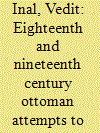

|
|
|
| 9 |
ID:
152919
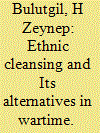

|
|
|
|
|
| Summary/Abstract |
According to the extant literature, state leaders pursue mass ethnic violence against minority groups in wartime if they believe that those groups are collaborating with an enemy. Treating the wartime leadership of a combatant state as a coherent unit, however, is misleading. Even in war, leaders differ in the degree to which they prioritize goals such as maintaining or expanding the territory of the state, and on whether they believe that minority collaboration with the enemy influences their ability to achieve those goals. Also, how leaders react to wartime threats from minority groups depends largely on the role that political organizations based on non-ethnic cleavages play in society. Depending on those cleavages, wartime minority collaboration may result in limited deportations and killings, ethnic cleansing, or minimal violence. A comparison of the policies of three multinational empires toward ethnic minority collaborators during World War I—the Austro-Hungarian Empire and Italians, the Ottoman Empire and Armenians, and the Russian Empire and Muslims in the South Caucasus—illustrates this finding.
|
|
|
|
|
|
|
|
|
|
|
|
|
|
|
|
| 10 |
ID:
155115
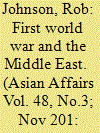

|
|
|
|
|
| Summary/Abstract |
The First World War in the Middle East swept away five hundred years of Ottoman dominion. It ushered in new ideologies and radicalized old ones – from Arab nationalism and revolutionary socialism to impassioned forms of atavistic Islamism. It created heroic icons, like the enigmatic Lawrence or the modernizing Atatürk, and it completely re-drew the map of the region, forging a host of new nation states, For many, the self-serving intervention of these powers in the region between 1914 and 1919 is the major reason for the conflicts that have raged there on and off ever since. Yet many of the most common assertions about the First World War in the Middle East and its aftermath are devoid of context. This article argues that, far from being a mere sideshow to the war in Europe, the Middle Eastern conflict was in fact the centre of gravity in a war for imperial interests. Moreover, contrary to another persistent myth of the First World War in the Middle East, local leaders and their forces were not simply the puppets of the Great Powers. The way in which these local forces embraced, resisted, succumbed to, disrupted, or on occasion overturned the plans of the imperialist powers for their own interests in fact played an important role in shaping the immediate aftermath of the conflict – and in laying the foundations for the troubled Middle East.
|
|
|
|
|
|
|
|
|
|
|
|
|
|
|
|
| 11 |
ID:
183742
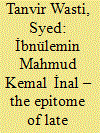

|
|
|
|
|
| Summary/Abstract |
İbnülemin Mahmud Kemal İnal was born in Istanbul as the son of a Pasha and, spending his entire working life as a bureaucrat, reached the highest levels in the Ottoman Civil Service. His career spanned the last years of the Ottoman Empire as well as the first decades of the Turkish Republic. As a result, he became uniquely qualified to write about people and events he had witnessed. He had a remarkably keen memory, and a high level of accomplishment in Arabic, Persian and French. With deep interests in literature, history, calligraphy, art and Turkish classical music, he almost became a one-man cultural institution. As a lifelong bachelor, he spent much time and effort in order to produce several encyclopaedic works on late Ottoman history, literature, music and culture.
|
|
|
|
|
|
|
|
|
|
|
|
|
|
|
|
| 12 |
ID:
146977
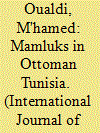

|
|
|
|
|
| Summary/Abstract |
This essay examines how administrative documents categorized the mamluks who served Ottoman governors of Tunis from the early 18th to the mid-19th century. The categorization of these state slaves-cum-servants illuminates three issues, namely, the relationships between Islamic states and societies, interactions between the Ottoman Empire and its provinces, and forms of military slavery around the globe. Seeing registers, letters, and historical chronicles as spaces of interaction allows us to break free from an a priori definition of mamluks. By exploring how slaves and servants contributed to defining themselves in administrative documents, I not only argue for a new understanding of the mamluk category, but also show that mamluks did not separate state and society. On the contrary, in the Tunisian case, mamluks connected the state to various imperial and provincial social forces.
|
|
|
|
|
|
|
|
|
|
|
|
|
|
|
|
| 13 |
ID:
025429
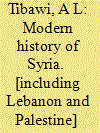

|
|
|
|
|
| Publication |
London, Macmillan and Co. Ltd, 1969.
|
| Description |
441p.: plates, mapshbk
|
|
|
|
|
|
|
|
|
|
|
|
Copies: C:1/I:0,R:0,Q:0
Circulation
| Accession# | Call# | Current Location | Status | Policy | Location |
| 004593 | 956.9/TIB 004593 | Main | On Shelf | General | |
|
|
|
|
| 14 |
ID:
081143
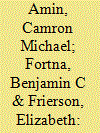

|
|
|
|
|
| Publication |
Oxford, Oxford University Press, 2007.
|
| Description |
xl, 657p.pbk
|
| Standard Number |
9780199236312
|
|
|
|
|
|
|
|
|
|
|
|
Copies: C:1/I:0,R:0,Q:0
Circulation
| Accession# | Call# | Current Location | Status | Policy | Location |
| 053254 | 956.015/AMI 053254 | Main | On Shelf | General | |
|
|
|
|
| 15 |
ID:
106950
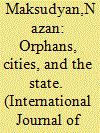

|
|
|
|
|
| Publication |
2011.
|
| Summary/Abstract |
This article examines the relationship between state and society in the Ottoman Empire during the 17th and 18th centuries by examining concepts and practices of privacy. Fatwas of Ottoman jurists reveal certain principles ordering the division of urban areas into public and private spaces. The article explores their application during the rebuilding of Damascus after its devastation by an earthquake in 1759. Archival sources disclose the priorities that guided the state in reconstructing a ruined provincial capital: religious values; a concern for the inhabitants' well-being; and, rather prominently, an intent to maintain a dichotomy between public and private. In this the Ottomans were different from their contemporary European counterparts, who often took advantage of major disasters to reshape relations between rulers and subjects. This divergence is demonstrated in this article by comparing post-1759 Damascus with London after the Great Fire of 1666 and Lisbon after the 1755 earthquake.
|
|
|
|
|
|
|
|
|
|
|
|
|
|
|
|
| 16 |
ID:
082008
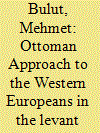

|
|
|
| 17 |
ID:
102601
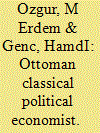

|
|
|
|
|
| Publication |
2011.
|
| Summary/Abstract |
In the 1840s Sarantis Archigenes, an Ottoman Greek citizen, wrote a book on political economy called Tasarrufat-i Mulkiye. The book contained both political-economic knowledge and developmentalist policy recommendations for the Ottoman Empire. The emphasis given to human capital, trade and transportation, industrialization and property relations is noteworthy. Since it did not reach large numbers of people, the importance of Tasarrufat-i Mulkiye has not been appreciated. The goal of this article is to provide an account of Archigenes' views on political economy as presented in his long-neglected book. Had the policy makers in the Empire in the second half of the nineteenth century taken Archigenes' views seriously, a sound development strategy could have been formed.
|
|
|
|
|
|
|
|
|
|
|
|
|
|
|
|
| 18 |
ID:
073586
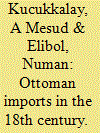

|
|
|
| 19 |
ID:
104153
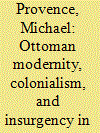

|
|
|
| 20 |
ID:
084606


|
|
|
|
|
|
|
|